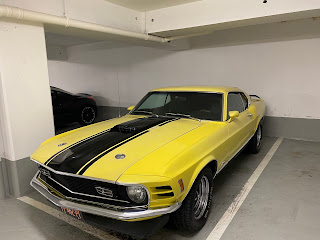Twas the night before Basic, and I drank way too much.
I have no photos from my Air Force enlistment.
Fifty years ago today I arrived at Lackland Air Force Base, San Antonio. I was hung over with shoulder-length hair and at the beginning of an on-again off-again relationship with the United States military that would finally end 44 years later in May 2016. The story of that first haircut is here.
Since my first of my four different service branches was the Air Force, basic training was mostly marching and learning military culture. We had one afternoon on the rifle range, one hike, and one meal outdoors--at picnic tables. In the nearly three years of my Air Force enlistment I never saw C-Rations let alone tasted them. Decades later I did a comparison of C-Rations and the current MRE meals that got 100,000+ views on YouTube. Here is the video.
When I left my home in Stoneham, Massachusetts, the Beatles were still together, Elvis was still alive, the Vietnam War was still raging, the Cold War was heating up, the draft was in its last full year, the Muscle Car boom of the 1960s was nearly over, and Donny Osmond had two songs in the top ten singles of 1971.
Speaking of music, while my shoulder-length hair was shorn from my head in the Air Force barber shop, Merle Haggard's "Okie From Muskogee" played in the background. The only country songs I heard up to that point in my life were some Johnny Cash breakthrough hits that ended up on Top 40 radio, like "A Boy Named Sue." In one of the ironies of military life, Fort Sill, Oklahoma, was the place I trained to deploy to Iraq 37 years later in 2009. In one of the many coincidences of dates in my life, my basic training and pre-deployment training both began on February 1.
In 1972, phones had wires and were often attached to walls. Every Sunday at basic training we lined up at phone booths to call home. Cameras had film. Barracks had liars. Extravagant liars. My basic training flight was forty men either 18 or 19 years old, from more than twenty states across the nation, living in one big room. Before lights out, we would shine our shoes in groups and talk. Some conversations were about training or life in the barracks, or the food we ate, but when the subject was home, the lies swelled to the size of a Goodyear Blimp. I wrote about those lies and how Facebook killed the barracks liar.
When we marched we sang songs about killing the enemy, Viet Cong mostly, occasionally a Russian, we sang about our nearly infinite appetites for sex and alcohol, and we sang about Jody--the guy who was back home sleeping with our wife/girlfriend, driving our car, emptying our meager bank account, and in its best country version, alienating the affections of a favorite hunting dog.
At my last military training school in 2013, we were not allowed to sing any of those songs. All five military services were in our marching formations, and none of them were allowed to sing any marching song that could be considered sexist. And even though we were in two active wars, we could not sing about an enemy. Jody was off limits. I wrote about the change in the songs for the New York Times At War blog.
The world in which I enlisted is gone. I am writing this in a cafe in Paris on a computer with more processing power than the computers that put a man on the moon in 1969. The flight from home to basic training fifty years ago was the first time I had been west of Cleveland or south of Pennsylvania. It was my first flight on an airplane. Earlier this month, my flight to Paris was the beginning of what may be my seventieth trip to another continent either on business, pleasure or a military mission.
I have a love/hate relationship with the military. Three times, I got out, and said I was done: in 1974, 1979 and 1985. Three times, I re-enlisted: in 1975, 1982 and 2007. I finally left the Army National Guard in 2016. Now I am far too old to change my mind again. And I am happy with that. I spent some of the best years of my life in the military, but even if I were not too old, I am happy to let the men and women born in this century defend the country.






















